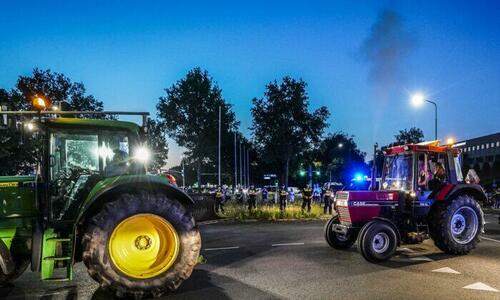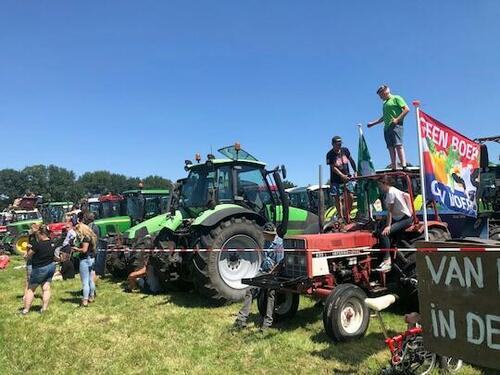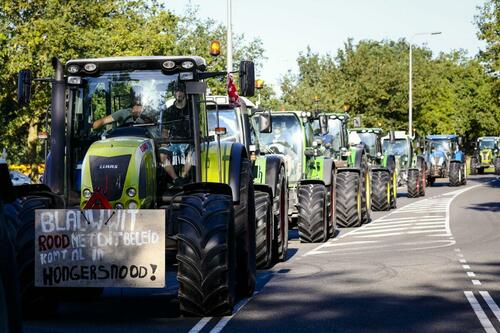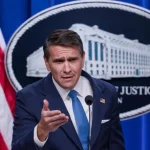
Thousands of tractor-driving Dutch protesters came out this week to continue demonstrations against the government's radical plan to cut nitrogen emissions by 30% - 70% as part of their 'green' agenda.
Farmers from the world's 5th largest exporter of food are demanding that the Hague immediately reverse course, and have blocked the border between Holland and Germany over the rule which would lead to the closure of dozens of farms and cattle ranches.
Very angry Dutch farmers block border between Holland and Germany. Harsh protests in many Dutch cities after politicians' decision to closes dozens of farms and cattle ranches to reduce nitrogen by 30% - 70% to comply with EU regulations on nitrogen pollution. pic.twitter.com/uKYXj0gvD8
— RadioGenova (@RadioGenova) June 30, 2022
On Wednesday, dozens of tractors blocked a highway close to the German border, according to traffic authorities.
Even larger protests are scheduled for July 4, with organizers taking to Telegram to call people to action against rules they say will "flatten" the country's agriculture industry.
According to the Epoch Times, the message calls on concerned farmers and citizens to organize their own regional actions with the goal of closing all “distribution centers for food supplies and all major polluters” until “the government changes its plans.”
One viral call for a July 4 protest came from a large truckers’ Telegram group, suggesting that some truckers in the Netherlands may find themselves in solidarity with the nation’s agriculturalists.
The farmers, who plan to protest at many of the nation’s airports, specifically mentioned Schiphol and Eindhoven. NLTimes.nl has reported that spokespersons for both airports say they are monitoring the situation but have little information at present.
Holland closes dozens of farms and cattle ranches to reduce nitrogen by 30%. Angry and hungry farmers block the nation everywhere. pic.twitter.com/VNSodhGanB
— RadioGenova (@RadioGenova) June 28, 2022
In 2021, the Netherlands’ coalition government proposed slashing livestock numbers in the country by 30 percent to meet nitrogen emissions targets.
The country has already implemented stringent restrictions on new construction with the aim of curbing nitrogen emissions.
Rabobank has argued that those new hurdles have slowed down homebuilding in the Netherlands, intensifying a housing shortage in the densely populated coastal nation.
On June 10, the government issued a national and area-specific plan for curbing nitrogen emissions. Those emissions are heavily driven by ammonia from livestock manure.
Some parts of the country would have to slash those emissions by 70 or even 95 percent.
It openly acknowledged that “there is not a future for all [Dutch] farmers within [this] approach,” as reported by the U.S. Department of Agriculture’s Foreign Agriculture Service.
“The Minister of Nature and Nitrogen Policy expects about a third of the 50,000 Dutch farms to ‘disappear’ by 2030,” the New Zealand Ministry of Foreign Affairs and Trade reported in a June 23 Market Insight Report.
The Netherlands is the world’s fifth-largest exporter of food, exceeded only by the United States, Germany, the United Kingdom, and China, according to World Bank statistics.
The Dutch government offers a multibillion-dollar buyout arrangement for farmers.
Christianne van der Wal, minister of nature and nitrogen policy, has left open the possibility that the government will expropriate land from farmers who do not comply, as reported by NOS Nieuws.
The proposals and resultant protests come amid worldwide fertilizer and food shortages.
United Nations Secretary-General Antonio Guterres warned on June 24 that “there is a real risk that multiple famines will be declared in 2022,” adding that “2023 could be even worse.”
On a recent episode of “Facts Matter” on EpochTV, American farmer John Boyd, Jr. warned of potential food shortages as a result of steeply rising input costs.
He said the expenses of running his own operation have tripled, driven in large part by significantly increased fertilizer costs.
In Sri Lanka, a ban on chemical fertilizers contributed to an economic crisis that has destabilized the government.
The country has recently announced a temporary ban on fuel sales to private vehicles, effective June 27 through July 10.
The latest round of demonstrations by Dutch farmers comes after a wave of similar protests in 2019 after lawmaker Tjeerd de Groot called for livestock numbers in the Netherlands to be cut by 50 percent.
Demonstrators have burned hay bales alongside highways, blocked roads with tractors, and spread manure to make their anger known.
In recent days, protesters have targeted the homes of Dutch government officials, including Prime Minister Mark Rutte and Nitrogen Minister van der Wal.
Footage circulating on social media purports to show protesters spraying manure on Dutch law enforcement.
Rutte criticized protesters, saying, “You can demonstrate, but in a civilized way,” as reported by the Associated Press.
AP also reports that Dutch police say they arrested 10 people on June 28 in connection with the protests.
Thousands of tractor-driving Dutch protesters came out this week to continue demonstrations against the government’s radical plan to cut nitrogen emissions by 30% – 70% as part of their ‘green’ agenda.
Farmers from the world’s 5th largest exporter of food are demanding that the Hague immediately reverse course, and have blocked the border between Holland and Germany over the rule which would lead to the closure of dozens of farms and cattle ranches.
Very angry Dutch farmers block border between Holland and Germany. Harsh protests in many Dutch cities after politicians’ decision to closes dozens of farms and cattle ranches to reduce nitrogen by 30% – 70% to comply with EU regulations on nitrogen pollution. pic.twitter.com/uKYXj0gvD8
— RadioGenova (@RadioGenova) June 30, 2022
On Wednesday, dozens of tractors blocked a highway close to the German border, according to traffic authorities.
Even larger protests are scheduled for July 4, with organizers taking to Telegram to call people to action against rules they say will “flatten” the country’s agriculture industry.
According to the Epoch Times, the message calls on concerned farmers and citizens to organize their own regional actions with the goal of closing all “distribution centers for food supplies and all major polluters” until “the government changes its plans.”
One viral call for a July 4 protest came from a large truckers’ Telegram group, suggesting that some truckers in the Netherlands may find themselves in solidarity with the nation’s agriculturalists.
The farmers, who plan to protest at many of the nation’s airports, specifically mentioned Schiphol and Eindhoven. NLTimes.nl has reported that spokespersons for both airports say they are monitoring the situation but have little information at present.
Holland closes dozens of farms and cattle ranches to reduce nitrogen by 30%. Angry and hungry farmers block the nation everywhere. pic.twitter.com/VNSodhGanB
— RadioGenova (@RadioGenova) June 28, 2022
In 2021, the Netherlands’ coalition government proposed slashing livestock numbers in the country by 30 percent to meet nitrogen emissions targets.
The country has already implemented stringent restrictions on new construction with the aim of curbing nitrogen emissions.
Rabobank has argued that those new hurdles have slowed down homebuilding in the Netherlands, intensifying a housing shortage in the densely populated coastal nation.
On June 10, the government issued a national and area-specific plan for curbing nitrogen emissions. Those emissions are heavily driven by ammonia from livestock manure.
Some parts of the country would have to slash those emissions by 70 or even 95 percent.
It openly acknowledged that “there is not a future for all [Dutch] farmers within [this] approach,” as reported by the U.S. Department of Agriculture’s Foreign Agriculture Service.
“The Minister of Nature and Nitrogen Policy expects about a third of the 50,000 Dutch farms to ‘disappear’ by 2030,” the New Zealand Ministry of Foreign Affairs and Trade reported in a June 23 Market Insight Report.
The Netherlands is the world’s fifth-largest exporter of food, exceeded only by the United States, Germany, the United Kingdom, and China, according to World Bank statistics.
The Dutch government offers a multibillion-dollar buyout arrangement for farmers.
Christianne van der Wal, minister of nature and nitrogen policy, has left open the possibility that the government will expropriate land from farmers who do not comply, as reported by NOS Nieuws.
The proposals and resultant protests come amid worldwide fertilizer and food shortages.
United Nations Secretary-General Antonio Guterres warned on June 24 that “there is a real risk that multiple famines will be declared in 2022,” adding that “2023 could be even worse.”
On a recent episode of “Facts Matter” on EpochTV, American farmer John Boyd, Jr. warned of potential food shortages as a result of steeply rising input costs.
He said the expenses of running his own operation have tripled, driven in large part by significantly increased fertilizer costs.
In Sri Lanka, a ban on chemical fertilizers contributed to an economic crisis that has destabilized the government.
The country has recently announced a temporary ban on fuel sales to private vehicles, effective June 27 through July 10.
The latest round of demonstrations by Dutch farmers comes after a wave of similar protests in 2019 after lawmaker Tjeerd de Groot called for livestock numbers in the Netherlands to be cut by 50 percent.
Demonstrators have burned hay bales alongside highways, blocked roads with tractors, and spread manure to make their anger known.
In recent days, protesters have targeted the homes of Dutch government officials, including Prime Minister Mark Rutte and Nitrogen Minister van der Wal.
Footage circulating on social media purports to show protesters spraying manure on Dutch law enforcement.
Rutte criticized protesters, saying, “You can demonstrate, but in a civilized way,” as reported by the Associated Press.
AP also reports that Dutch police say they arrested 10 people on June 28 in connection with the protests.








